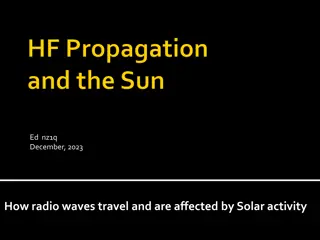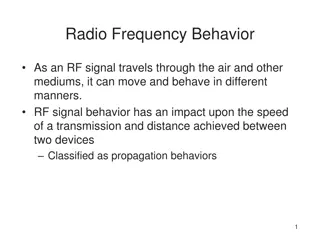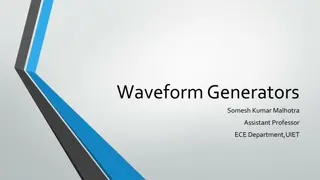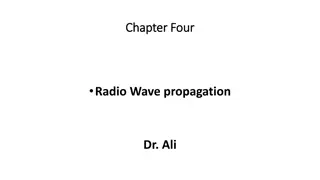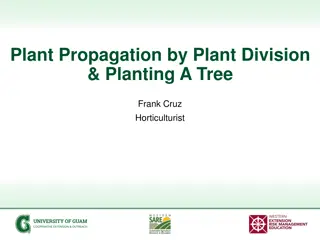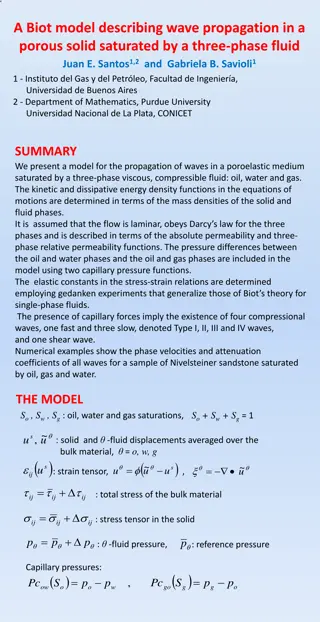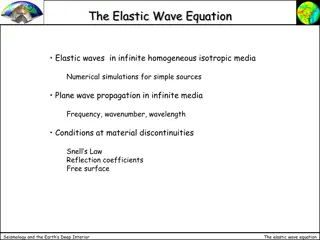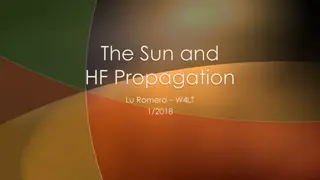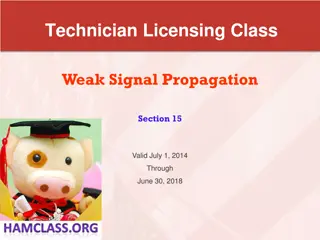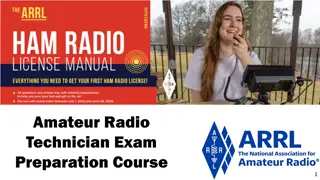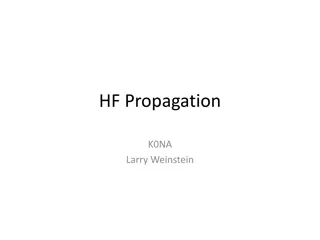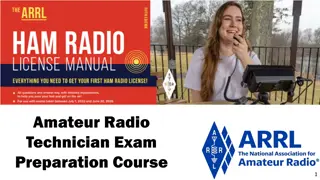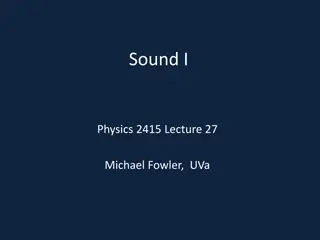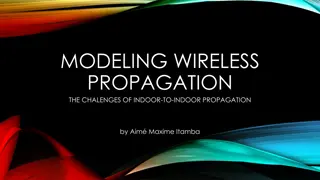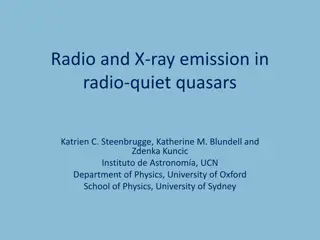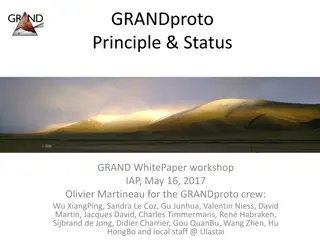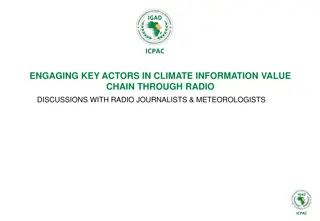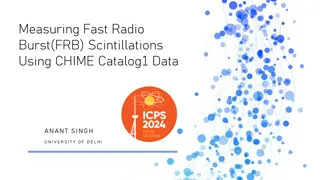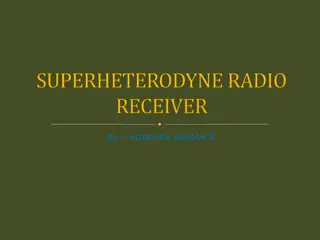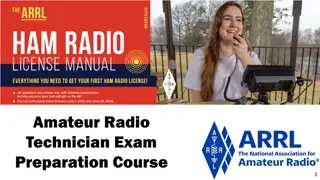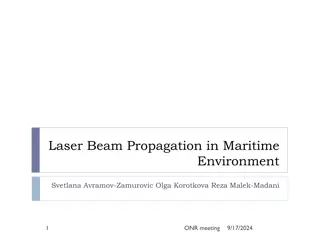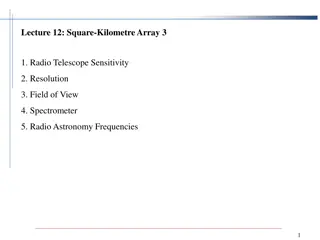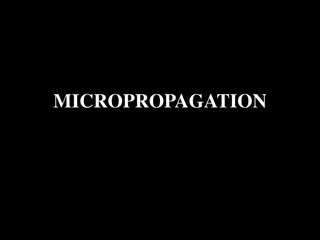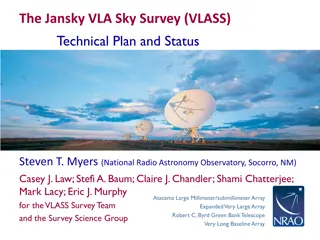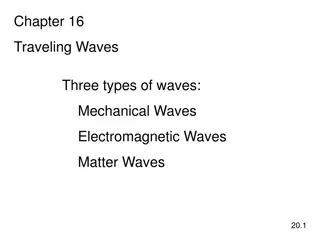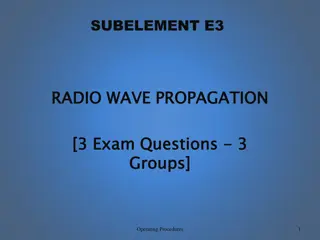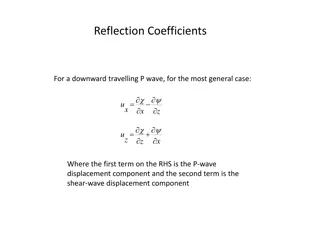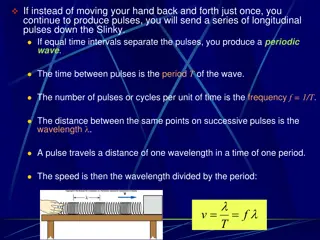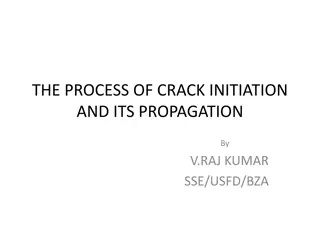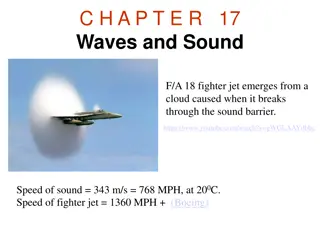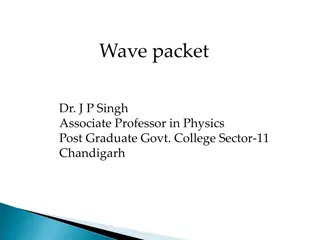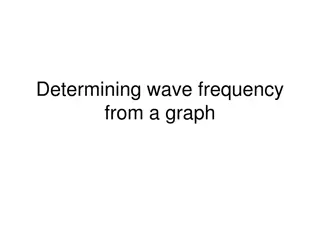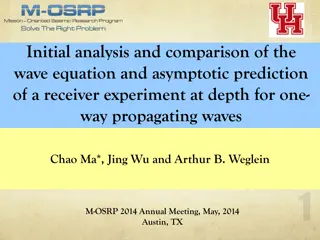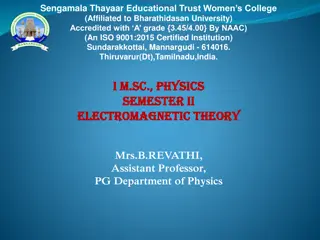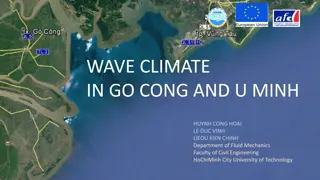Understanding Waves, Light, & Sound: Vocabulary and Concepts
This chapter covers essential vocabulary and concepts related to waves, light, and sound, including amplitude, crest, diffraction, Doppler effect, electromagnetic wave, frequency, interference, longitudinal wave, mechanical wave, medium, photon, pitch, reflection, refraction, sound wave, standing wa
8 views • 21 slides
Understanding Cylindrical Wave Functions and Bessel Equations in Electromagnetics
Exploring cylindrical wave functions and Bessel equations, derived from the Helmholz equation, for understanding wave propagation dynamics in electromagnetics. The notes cover separation of variables, solutions for R and Z, Bessel functions, and more.
3 views • 50 slides
Hydrologic Modeling Methods in HEC-HMS: A Comprehensive Overview
Explore the transformative methods within HEC-HMS hydrologic modeling, including unit hydrograph derivation, excess precipitation transformation, hydrograph illustration, surface transform methods, and concepts like the kinematic wave and 2D diffusion wave. Learn about the unit hydrograph, kinematic
0 views • 41 slides
Understanding Software-Defined Radio (SDR) with GNU Radio Introduction
Software-defined radio (SDR) revolutionizes radio technology by enabling flexible software-based solutions that can alter transmitter parameters without hardware changes. The SDR tiers defined by the SDR Forum provide evolving capabilities in terms of flexibility, transitioning from hardware-control
5 views • 54 slides
Understanding Radio Wave Propagation and Solar Activity Effects
Explore how radio waves travel and are influenced by solar activity. Learn about HF radio wave propagation, critical layers, day-night cycle effects, sunspots, coronal mass ejections, solar wind, auroras, and more. Discover the impacts of solar flux, sunspot numbers, and solar flares on radio wave c
7 views • 45 slides
Understanding Radio Frequency Behavior and Propagation Behaviors
Radio frequency signals exhibit various behaviors as they travel through different mediums, affecting transmission speed and distance between devices. Propagation behaviors include absorption, reflection, scattering, refraction, and diffraction, impacting wireless network performance. Understanding
2 views • 32 slides
Understanding Waveform Generators in Electronic Circuits
Waveform generators, such as square wave oscillators and triangular wave generators, play crucial roles in electronic circuits. Square wave oscillators use capacitors and op-amps to create square wave outputs through charging and discharging processes. On the other hand, triangular wave generators u
1 views • 11 slides
Understanding Radio Wave Propagation in the Ionosphere
Radio wave propagation in the ionosphere is influenced by factors such as the radio refractive index and absorption of radio wave energy. This chapter delves into the interaction of radio waves with the ionosphere, discussing concepts like the electromagnetic spectrum nomenclature and the frequency
0 views • 15 slides
Plant Propagation Techniques and Tree Planting Guide
Learn various plant propagation methods such as division, bulbs and corms, tubers and rhizomes, along with essential tips for planting and care. Understand the processes of asexual propagation and division with detailed steps for successful plant propagation and growth. Discover how to propagate pla
0 views • 7 slides
Understanding Complex Wavevectors in Homogeneous Media
Exploring the concept of complex wavevectors in a homogeneous medium, this content delves into monochromatic waves, Maxwell equations, wave propagation, and the relationship between material properties and wave behavior. It discusses how the complex nature of wavevectors impacts fields, damping, and
0 views • 17 slides
Model for Wave Propagation in Poroelastic Medium Saturated by Three-Phase Fluid
We introduce a model describing wave propagation in a porous solid saturated by a three-phase fluid (oil, water, and gas). The model considers kinetic and dissipative energy density functions, laminar flow obeying Darcy's law, and capillary pressure functions. Elastic constants are determined using
1 views • 4 slides
Understanding Elastic Wave Equations in Seismology
Explore the fundamentals of elastic wave equations for seismology, including topics such as plane wave propagation, reflection coefficients, and wavefield simplifications using curl and div operators. Learn about P-waves, shear waves, and elastodynamic potentials in the context of infinite homogeneo
0 views • 31 slides
Understanding HF Propagation and Solar Activity
Explore the basics of HF propagation, how solar activity influences band conditions, and the impact of phenomena like sunspots, flares, and CMEs. Learn which bands to use for effective communication and grasp the fundamentals of wave propagation, refraction, and reflection. This presentation provide
0 views • 30 slides
Understanding Weak Signal Propagation in Radio Waves
This informative content delves into weak signal propagation and its various aspects related to electromagnetic waves, particularly in the context of radio communication. It covers topics such as radio waves, radio horizon, knife-edge diffraction, tropospheric scatter mode, auroral reflection, and m
1 views • 37 slides
Understanding Radio Wave Propagation for Amateur Radio Technicians
Discusses the various ways radio waves propagate based on frequency and environmental characteristics, including line of sight, ground wave, and sky wave. Explains how radio energy travels in a straight line, follows the Earth's surface, reflects, refracts, and diffracts. Covers multipath interferen
0 views • 120 slides
Understanding HF Propagation for Amateur Radio Communication
Dive into the world of HF propagation and how signals travel from one point to another in amateur radio communication. Explore topics such as ionosphere basics, critical frequency, practical examples, and the importance of the F2 layer. Gain insights into launching waves, propagation prediction meth
0 views • 34 slides
Amateur Radio Technician Exam Preparation Overview
Dive into the world of Amateur Radio Technician Exam Preparation with a focus on licensing regulations, types and classes of licenses, sample licenses, exam procedures, and more. Learn about the FCC's rules for the amateur radio service, licensing terms, the different classes of licenses available,
1 views • 51 slides
Understanding Sound Waves: Exploring Wave Phenomena in Physics
Delve into the intricacies of sound waves in Physics with a focus on standing waves, boundary conditions, amplitude variations, and wave interactions. Explore concepts like harmonic wave addition, pulse encounters, and outcomes at fixed and free ends of a string. Discover how different scenarios aff
0 views • 22 slides
Understanding Wireless Propagation Models: Challenges and Applications
Wireless propagation models play a crucial role in characterizing the wireless channel and understanding how signals are affected by environmental conditions. This article explores the different propagation mechanisms like reflection, diffraction, and scattering, along with the challenges and applic
1 views • 14 slides
Insights into Radio and X-ray Emission in Radio-Quiet Quasars
Radio galaxies are categorized as radio-loud or radio-quiet based on the presence of jets and lobes. Unlike radio-loud quasars, the nuclear radio emission in radio-quiet quasars does not originate from large-scale jets. Possible explanations include broad absorption lines, magnetically accelerated e
0 views • 15 slides
Overview of GRANDproto Project Workshop on Autonomous Radio Detection
GRANDproto project workshop held in May 2017 focused on improving autonomous radio detection efficiency for the detection of extensive air showers (EAS). Issues such as detector stability and background rates were discussed, with the goal of establishing radio detection as a reliable method for EAS
1 views • 14 slides
Engaging Key Actors in Climate Information Value Chain Through Radio Discussions
In this discussion, the importance of engaging key actors along the climate information value chain through radio discussions is emphasized. The symbiotic relationship between radio journalists and meteorological authorities is highlighted, as well as the key actors involved such as Government Agenc
0 views • 22 slides
Exploring Fast Radio Bursts (FRBs) and Scintillations in the Universe
Fast Radio Bursts (FRBs) are millisecond-duration bursts of radio waves originating from outside our galaxy, offering researchers a unique opportunity to investigate baryon distributions and probe the cold gas clumps in the Universe. Scintillations in radio waves caused by irregularities in the inte
1 views • 25 slides
Introduction to Superheterodyne Radio Receiver Circuits
Superheterodyne radio receiver circuits operate based on heterodyne or frequency mixing principles. These circuits involve using a local oscillator to mix the incoming signal with a sine wave, shifting it to an intermediate frequency (IF) for further processing and demodulation. The design includes
0 views • 16 slides
Understanding Radio Communication Essentials for Amateur Radio Technician Exam
Dive into the fundamentals of radio communication for the Amateur Radio Technician Exam. Explore topics such as modulation, equipment, transmission, reception, and the art of adding and extracting information from radio waves. Gain insights into how information is converted, transmitted, and receive
0 views • 105 slides
Laser Beam Propagation in Maritime Environment Study
Investigation and comparison of laser beam propagation in maritime environments through field and laboratory experiments. The study examines the effects of real-life conditions such as temperature fluctuations, wind, and aerosols on laser light propagation. A basic field experiment at the US Naval A
0 views • 11 slides
Understanding Radio Telescope Sensitivity and Resolution in Radio Astronomy
This lecture covers the concepts of radio telescope sensitivity in detecting small temperature variations from the sky, including factors such as radiometric sensitivity, antenna noise temperature, receiver system noise, and more. Additionally, it touches upon the resolution capabilities of radio te
0 views • 22 slides
Understanding Micropropagation: A Clonal Propagation Method
Micropropagation is a popular method for vegetative propagation in plants, providing genetically identical copies through aseptic tissue culture techniques. This technique allows for mass production of true-to-type plantlets in a short time, crucial for the commercial propagation of horticultural cr
0 views • 42 slides
The Jansky VLA Sky Survey (VLASS) Technical Plan and Status Summary
The Jansky VLA Sky Survey (VLASS) is a comprehensive project aimed at capturing unique snapshots of the radio sky through various radio studies and imaging techniques. The survey covers a wide range of frequencies and configurations, enabling detailed exploration of the radio universe. With a focus
0 views • 10 slides
Understanding Traveling Waves: Types, Properties, and Equations
Explore the world of traveling waves, including mechanical, electromagnetic, and matter waves. Learn about transverse and longitudinal wave motion, the speed of waves in strings, wave frequency, wavelength, and speed relationships, as well as wave equations for non-repeating waves over space and tim
1 views • 30 slides
Understanding Radio Wave Propagation and Operating Procedures in Subelement E3
Explore the fascinating world of radio wave propagation, including topics such as Earth communications, meteor scatter, microwave propagation, aurora propagation, and various techniques like trans-equatorial propagation. Learn about the maximum separation between stations communicating by Moon bounc
1 views • 101 slides
Understanding Reflection Coefficients in Wave Propagation
Reflection coefficients play a crucial role in wave propagation, particularly for P and shear waves. The equations governing reflection coefficients provide insight into wave behavior at boundaries and interfaces. By examining the conditions and special cases, we can understand how these coefficient
0 views • 33 slides
Understanding Wave Properties and Standing Waves in Physics
Exploring the concepts of periodic waves, superposition, and standing waves in physics using examples such as a Slinky, two waves traveling in opposite directions, and a guitar string. Learn about wave speed, frequency, wavelength, nodes, antinodes, and the impact of tension on wave propagation. Dis
1 views • 17 slides
Understanding the Process of Crack Initiation and Propagation
The process of crack initiation and propagation in materials is essential to comprehend for assessing fracture risk. This involves calculating defect sizes using fracture toughness values and understanding how cracks develop under repeated stresses, leading to fast fractures. The direction of crack
0 views • 36 slides
Understanding Waves and Sound: A Visual Exploration
Explore the nature of waves and sound through a visual journey covering topics like transverse waves, longitudinal waves, water waves, periodic waves, wave speed, the speed of a wave on a string, the nature of sound, and the frequency of sound waves. Discover how waves carry energy, the different ty
1 views • 32 slides
Understanding Wave-Particle Duality in Physics
Explore the complex relationship between particles and waves in physics, as particles exhibit wave-like behavior described by wave packets rather than single waves. Delve into the concept of group velocity and phase velocity, and how a particle's behavior is represented by a wave function. Uncover t
0 views • 12 slides
Understanding Wave Frequency and Periodicity Graphically
This instructional material provides a visual guide on determining wave frequency and period from graphs displaying wave cycles over time. It explains concepts such as the relationship between cycles and time, measuring frequency in Hertz (Hz), understanding wave periods, and calculating frequencies
0 views • 25 slides
Analysis and Comparison of Wave Equation Prediction for Propagating Waves
Initial analysis and comparison of the wave equation and asymptotic prediction of a receiver experiment at depth for one-way propagating waves. The study examines the amplitude and information derived from a wave equation migration algorithm and its asymptotic form. The focus is on the prediction of
0 views • 23 slides
Understanding Electromagnetic Waves in Physics
Exploring the propagation of electromagnetic waves in different mediums such as free space and isotropic dielectrics. Discusses Maxwell's equations, wave equations, transverse nature, energy transmission, and impedance in electromagnetic wave propagation.
0 views • 24 slides
Study on Wave Climate in Go Cong and U Minh Regions
This study focuses on analyzing the wave climate in Go Cong and U Minh areas in Vietnam using the Telemac-Tomawac wave model. The research covers the simulation of wind-wave characteristics in the East Sea and West South Sea over a 3-year period. Data input, model setup, calibration, and computed do
1 views • 27 slides




